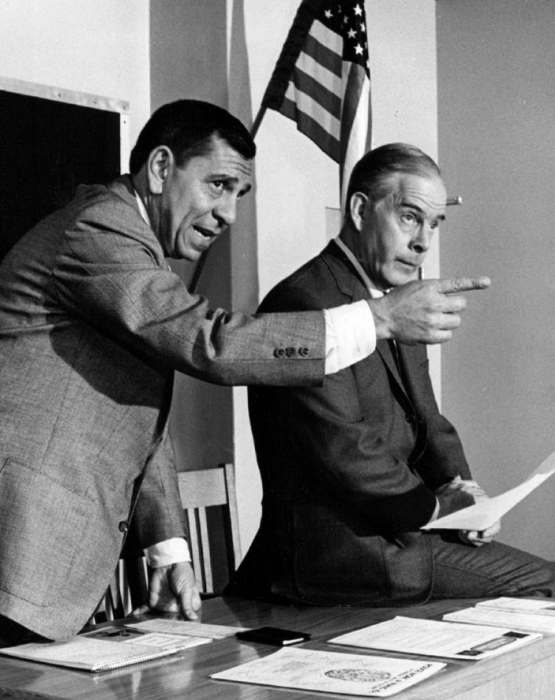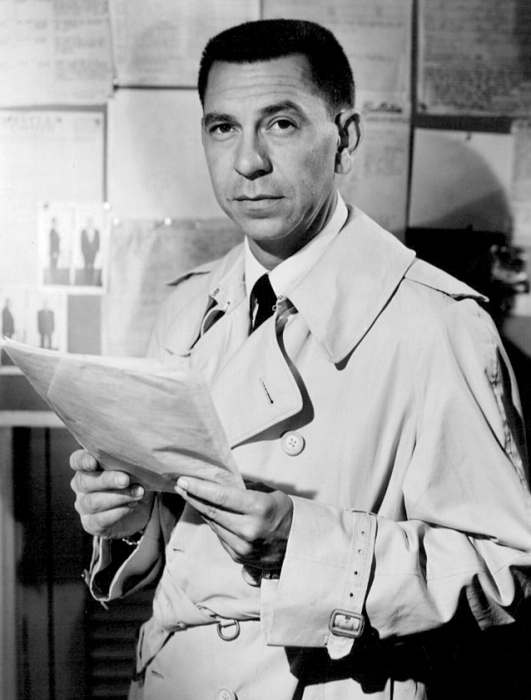“Dragnet” is a classic TV show that many people still remember. It first came out as a radio show in 1949 and then appeared on TV in 1951. Jack Webb created it and played the main character, Detective Joe Friday. The show was known for being very detailed and realistic, showing what police work was like. They even used real police badges and cars, and the sets looked just like the real police offices in Los Angeles.
“Dragnet” wasn’t just a show; it made people think differently about the police and inspired other TV shows to be more realistic. In this article, we will share some cool facts about “Dragnet,” from how it was made to the impact it had on TV and real police work.
Background and Creation
“Dragnet” made its initial debut as a radio drama in 1949, captivating audiences with its unique blend of crime-solving stories and real-life police procedures. The brainchild of Jack Webb, who would later become synonymous with the character of Detective Joe Friday, “Dragnet” stood out for its commitment to realism and detail. This dedication to authenticity wasn’t just a creative choice; it was a reflection of Webb’s vision to portray law enforcement and their daily challenges with as much accuracy as possible.
The transition from radio to television in 1951 marked a significant milestone for “Dragnet” and for TV history. It became one of the first radio programs to successfully make the leap to the television format, setting a precedent for future shows. The addition of visual elements allowed Webb to deepen the show’s commitment to realism, using actual LAPD badges and squad cars and even meticulously recreating the Police Administration Building’s interiors for the set.
Jack Webb: The Man Behind the Badge
Jack Webb wasn’t just the star of “Dragnet”; he was its driving force. His portrayal of the straight-laced, no-nonsense Detective Joe Friday became iconic, but initially, Webb had no intention of stepping in front of the camera for the television version. He envisioned himself primarily as the creator and director of the series. However, the network insisted on Webb continuing the role of Joe Friday, leading to one of the most memorable casting decisions in television history.
Webb’s approach to “Dragnet” was innovative. He didn’t just rely on scriptwriters to come up with engaging stories; he sought input directly from the LAPD, ensuring that each episode reflected the realities of police work. This collaboration with law enforcement was more than just a way to gather stories; it was part of Webb’s commitment to showing the police in a light that was both honest and respectful.
The Legacy Begins
“Dragnet’s” impact was immediate and far-reaching. It didn’t just entertain; it informed, offering viewers a glimpse into the world of law enforcement that few had seen before. The show’s documentary-style approach, combined with Webb’s understated performance, created a new standard for realism in television. “Dragnet” wasn’t just a hit; it was a cultural phenomenon that would influence countless shows that followed, making it a cornerstone of television history.
Jack Webb’s Role and Vision
Jack Webb, the mastermind behind “Dragnet,” was not merely the show’s creator; he was its heart and soul. Taking on multiple roles as the director, producer, and star, Webb was instrumental in every aspect of the show’s development. His portrayal of Detective Joe Friday became legendary, embodying the quintessence of a dedicated and unflappable law enforcement officer. However, Webb’s contribution to “Dragnet” extended far beyond his on-screen presence.
Commitment to Realism
Webb’s unwavering commitment to authenticity set “Dragnet” apart from other shows of its time. He insisted on a documentary-style approach that prioritized factual accuracy over dramatic embellishments. This dedication to realism was evident in every detail of the show, from the script to the set design. Webb worked closely with the Los Angeles Police Department (LAPD), incorporating real-life cases and police procedures into the storylines. This collaboration ensured that “Dragnet” portrayed the challenges and nuances of police work with unparalleled accuracy.
Influencing Public Perception
Webb’s vision for “Dragnet” was not just to entertain but to educate and shape public perception of law enforcement. By presenting the police in a positive and realistic light, Webb aimed to foster a deeper understanding and appreciation of the work they do. “Dragnet” was celebrated for its attention to detail and its portrayal of the LAPD as a bastion of integrity and justice. The show’s influence extended beyond the television screen, with police departments across the country using it as a training tool and a means to improve their image in the eyes of the public.
A Legacy of Influence
Jack Webb’s role in “Dragnet” and his visionary approach left an indelible mark on the television industry. His insistence on accuracy and realism not only set new standards for the portrayal of law enforcement on TV but also paved the way for future police procedural dramas. Webb’s legacy is evident in the countless shows that have followed in “Dragnet’s” footsteps, adopting its documentary-style narrative and commitment to realism. Through “Dragnet,” Webb created more than just a successful TV show; he crafted a new way of storytelling that continues to influence the genre to this day.
Series Impact and Legacy
Pioneering the Police Procedural Genre
With its groundbreaking debut on television in 1951, “Dragnet” introduced audiences to a new kind of crime drama, one that emphasized the procedural aspects of law enforcement and the day-to-day realities of police work. This approach was a significant departure from the more sensationalized and often glamorized portrayals of crime and policing in other media of the time. “Dragnet’s” focus on realism, from the use of actual police terminology to the depiction of routine investigative work, helped establish a template that countless television shows have since followed.
Impact on Public Perception and Law Enforcement
Jack Webb’s dedication to authenticity in “Dragnet” extended beyond the screen and had a tangible impact on the public’s perception of law enforcement. By closely collaborating with the LAPD and portraying police officers as competent, diligent professionals, “Dragnet” helped to foster a more positive image of the police among viewers. The show’s influence was so profound that it was reportedly used by police departments across the United States as a training tool and a way to promote the police’s role in society. This aspect of “Dragnet’s” legacy highlights the power of media to shape societal attitudes and the responsibility that comes with it.
Cultural Icon and Lasting Legacy
“Dragnet” has left a lasting legacy that extends well beyond its original run on television. The show’s iconic opening theme, the distinctive “dum-de-dum-dum” sound, and the phrase “Just the facts, ma’am” (although a slight misquote) have become deeply ingrained in American pop culture. Despite the passage of time, “Dragnet” remains a reference point for the police procedural genre and a symbol of 1950s and 60s television. Its influence can be seen in the numerous police dramas that followed, many of which have sought to emulate its realistic approach and attention to detail.
Revivals and Continued Relevance
The enduring popularity of “Dragnet” led to several revivals and adaptations over the years, including a notable return to television in the late 1960s and a feature film in the 1980s. These revivals not only introduced “Dragnet” to new generations of viewers but also demonstrated the timeless appeal of its straightforward, no-nonsense storytelling and its portrayal of the challenges faced by law enforcement. The fact that “Dragnet” continues to be relevant and engaging to audiences decades after its original broadcast is a testament to its quality and the visionary approach of its creator, Jack Webb.
“Dragnet’s” impact on television and its legacy as a pioneer in the police procedural genre is undeniable. Its realistic portrayal of police work, innovative storytelling, and cultural significance have ensured that “Dragnet” remains a cherished part of television history, influencing not only the shows that followed but also the way in which law enforcement is viewed by the public.
Interesting Facts About Dragnet
“Dragnet,” with its iconic “dum-de-dum-dum” theme and straightforward depiction of police work, has left behind a treasure trove of fascinating trivia that continues to intrigue fans and pop culture enthusiasts alike. Here are some of the most interesting tidbits about the series:
- The Famous Line That Wasn’t: One of the most quoted lines associated with “Dragnet,” “Just the facts, ma’am,” was never actually uttered by Joe Friday in its exact form. The closest variations used in the show were “All we want are the facts, ma’am” and “All we know are the facts, ma’am.”
- Real-Life Inspirations: The show’s creator, Jack Webb, was dedicated to realism, going to great lengths to depict police procedures and the daily operations of the LAPD accurately. This included using real police badges and squad cars and even basing some characters and episodes on actual LAPD cases and personnel.
- Jack Webb’s Initial Reluctance: Interestingly, Jack Webb, who became synonymous with the role of Sgt. Joe Friday initially had no interest in acting in the television adaptation of “Dragnet.” He had envisioned himself staying behind the scenes as the producer and director. The network, however, insisted on Webb playing the part, leading to his iconic portrayal.
- Innovative Filming Techniques: “Dragnet” was known for its unique, documentary-like approach to storytelling, which was a novel concept at the time. Webb employed innovative filming techniques, such as using tight close-ups and unusual camera angles, to enhance the show’s realistic feel.
- Badge Number Retirement: After Jack Webb’s death, the LAPD retired Joe Friday’s badge number, 714, in honor of Webb’s contribution to the positive portrayal of the police force through “Dragnet.”
- Impact on Law Enforcement Image: “Dragnet” was so well-regarded for its accurate portrayal of police work that police departments across the country used it as a training tool and to improve the public image of law enforcement.
- A Pioneer in Police Procedurals: “Dragnet” set the standard for the police procedural genre on television, influencing countless future series with its focus on realistic police work and procedures rather than personal dramas or sensationalized crime stories.
Conclusion
“Dragnet” remains a cornerstone of television history, celebrated for its pioneering approach to the police procedural genre and its realistic portrayal of law enforcement. From the iconic yet never-actually spoken line “Just the facts, ma’am” to the retirement of Joe Friday’s badge number by the LAPD, the series is wrapped in layers of intriguing trivia that continue to fascinate fans.
Jack Webb’s vision and dedication to authenticity not only entertained audiences but also significantly influenced public perceptions of police work. “Dragnet’s” legacy endures, cementing its place as a classic that set the standard for countless shows that followed.


